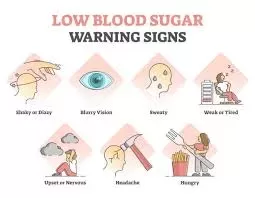What is Hypoglycemia?
Hypoglycemia is a condition in which your blood sugar (glucose) levels drop too low. Glucose is the body’s main source of energy, and it’s important to keep your levels in a healthy range. When your blood sugar levels drop, it can cause a variety of symptoms, including:
- Shakiness
- Sweating
- Dizziness
- Confusion
- Hunger
- Headache
- Numbness or tingling in the lips, tongue, or fingers
- Seizures
If you experience any of these symptoms, it’s important to check your blood sugar level right away. If your blood sugar level is below 70 milligrams per deciliter (mg/dL), you need to take steps to raise it.

Causes of Hypoglycemia
There are a number of things that can cause hypoglycemia, including:
- Taking too much insulin or other diabetes medication
- Skipping meals or not eating enough food
- Drinking alcohol on an empty stomach
- Exercising too strenuously without eating enough food
- Certain medical conditions, such as liver or kidney disease
- Certain medications, such as steroids
Treatment for Hypoglycemia
The treatment for hypoglycemia depends on the severity of your symptoms. If your symptoms are mild, you can usually treat them by eating or drinking something sugary, such as juice, candy, or glucose tablets. If your symptoms are more severe, you may need to take a shot of glucagon or go to the hospital.
Preventing Hypoglycemia
The best way to prevent hypoglycemia is to manage your diabetes carefully. This includes taking your medication as prescribed, eating regular meals and snacks, and exercising regularly. You should also talk to your doctor about how to adjust your diabetes treatment plan if you are experiencing frequent hypoglycemia.
Here are some tips for preventing hypoglycemia:
- Eat regular meals and snacks.
- Choose foods that are high in carbohydrates, such as bread, pasta, rice, fruits, and vegetables.
- Avoid skipping meals or going too long without eating.
- Exercise regularly, but not too strenuously on an empty stomach.
- Check your blood sugar level regularly, especially before and after meals, and at bedtime.
- Carry a source of sugar with you at all times, such as juice, candy, or glucose tablets.
- Talk to your doctor about how to adjust your diabetes treatment plan if you are experiencing frequent hypoglycemia.
We hope above article will help our readers to identify hypoglycemia condition and available treatments.
Thanks for visiting our website Gymbag4u.com
If you want to know more about diabetes disease, check following article link Define diabetes Cause of diabetes and Complications of Diabetes – (gymbag4u.com)